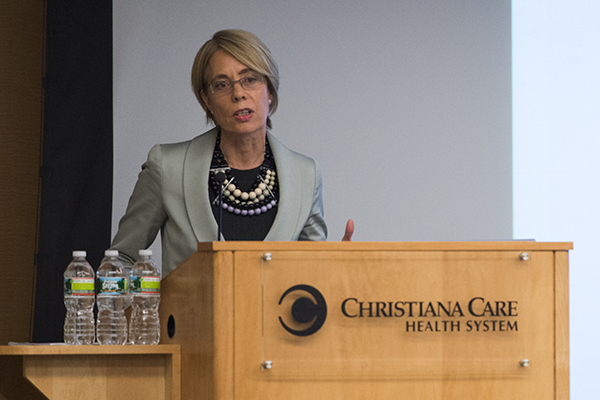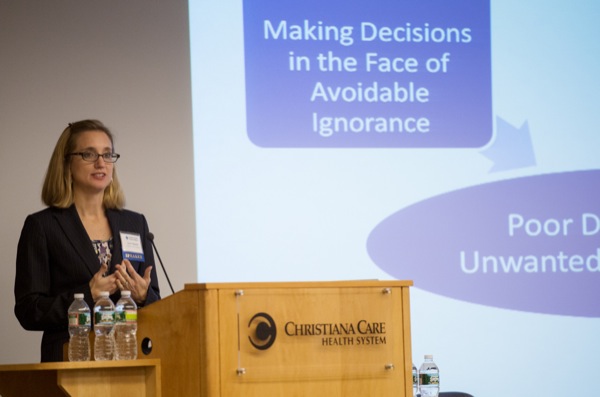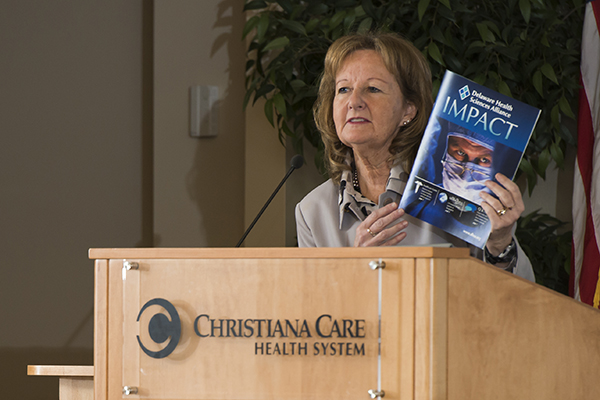Creating health partnerships
Delaware Health Sciences Alliance conference aimed at engagement
9:53 a.m., Dec. 5, 2012--Partnerships are integral to the Delaware Health Sciences Alliance (DHSA), so the organization was the perfect host for a conference on creating health partnerships.
On Friday, Nov. 30, more than 100 people convened at Christiana Care’s Ammon Center to hear experts talk about engaging individuals, providers, and communities in health decisions.
Campus Stories
From graduates, faculty
Doctoral hooding
Sessions were organized around these three groups of constituents, with a plenary presentation followed by a panel discussion in each area.
Engaging individuals
Margaret Moore, co-director of the Institute of Coaching at McLean Hospital (an affiliate of the Harvard Medical School Institute of Coaching), talked about the challenges of making and sustaining change.
“We’re all very good at starting to change but not very good at maintaining it,” she said. “Lasting change is about changing our brains. Our brains learn by making new connections, so to make sustainable change, we have to imagine a new brain network.”
Moore said that medicine is designed for acute not chronic care, and she emphasized that health coaching is an approach to wellness that depends on a partnership between the coach and the client. With the traditional expert approach, an authority figure defines the agenda, has all the answers, and solves the problem. Effective coaching, in contrast, is built on co-discovery of answers, with the coach facilitating rather than dictating change.
Mike Peterson, chair of the Department of Behavioral Health and Nutrition at the University of Delaware, led the panel, which included Beth Orsega-Smith, UD associate professor, Eric Sood (Nemours) and Jacqueline Ortiz (Christiana Care).
Engaging providers
Karen Sepucha, senior scientist in the Health Decision Research Unit at Massachusetts General Hospital, shared information about new decision-making tools being used at the hospital to help patients make informed choices about elective surgical procedures, health screenings, and medications.
According to Sepucha, research has shown that patients are not generally well informed, or meaningfully involved, and their preferences are not consistently part of the discussion.
Shared decision making is an iterative process between patients and clinicians that engages the patient in decision making, provides accurate information about options and outcomes, and enables treatments to be tailored to patients’ goals and concerns.
The use of this approach at Mass General has shown that comparative data and patient feedback are strong motivators, the physician champion role is important, and it’s critical to have an infrastructure in place to make things easier.
Doug Tynan (Nemours) moderated the panel, which included Eric Schwartz (Christiana Care) and Kirk Dabney (Nemours).
Engaging the community
Sandra Hassink, chair of the Governor’s Council on Health Promotion and Disease Prevention in Delaware, began by sharing the council’s charge, which is focused on promoting healthy lifestyles and preventing chronic and lifestyle-related disease.
“When we all understand and believe that the potential for avoiding chronic disease is within our control, we will take action and improve our health,” said Hassink, who is also director of the Nemours Obesity Initiative.
She acknowledged the influence of socioeconomic status, physical environment, education, and disabilities in creating health disparities and said that statewide, targeted, and culturally appropriate campaigns should be launched to promote health.
Objectives include engaging community-based organizations such as schools, workplaces, and faith-based organizations to promote healthy lifestyles; improving health literacy; and enhancing individual capacity to engage in healthy behaviors.
The panel, led by Mike Rosenthal (Christiana Care), included Peggy Geisler (Sussex County Health Promotion Coalition), Rosa Rivera (Henrietta Johnson Medical Center), Tom Stephens (Westside Family Healthcare), and Terry Casson-Ferguson (Christiana Care).
About DHSA
The Delaware Health Sciences Alliance was established in 2009 with four founding partners — Christiana Care Health System, Nemours/Alfred I. duPont Hospital for Children, Thomas Jefferson University and the University of Delaware.
The alliance enables partner organizations to collaborate and conduct cutting-edge biomedical research, to improve the health of Delawareans through access to services in the state and region, and to educate the next generation of healthcare professionals.
DHSA’s unique, broad-based partnership focuses on establishing innovative collaborations among experts in medical education and practice, health economics and policy, population sciences, public health, and biomedical sciences and engineering. For more information, visit the website.
Article by Diane Kukich
Photos by Kathy F. Atkinson















